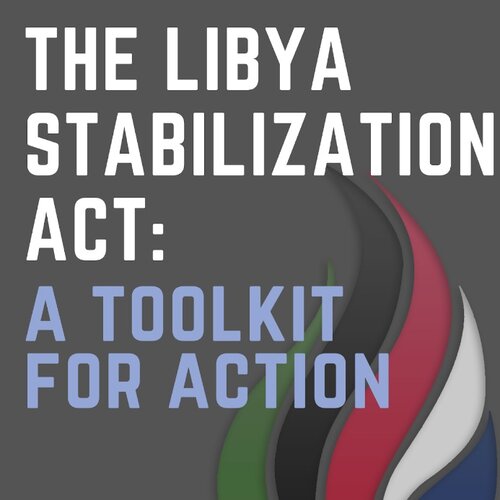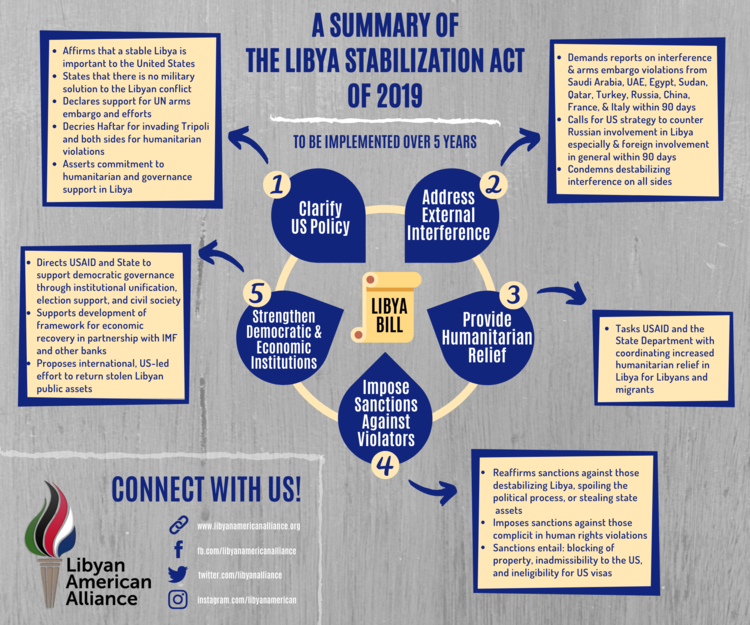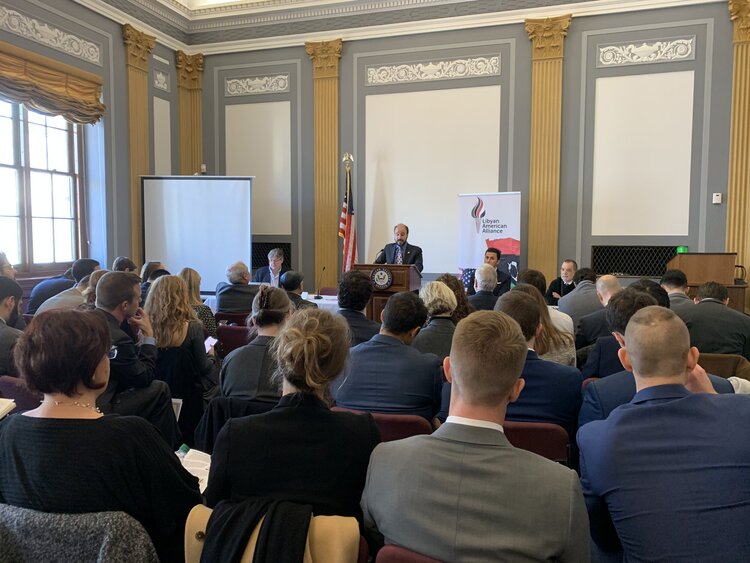THE LIBYA STABILIZATION ACT
Libyan American Alliance
As experts agree, U.S. leadership in Libya is critical in stopping the ongoing foreign intervention, ending the conflict, and ultimately, paving a path for a stable, democratic Libya. In the absence of executive action, in 2019, the Libya Stabilization Act (LSA) was introduced in both the U.S. House of Representatives and the U.S. Senate. Since then, the Libyan American Alliance has worked as a strong activist for the LSA, including developing a toolkit for action to help Libyan Americans advocate for the bill. In December 2019, the LAA organized a Capitol Hill presentation that featured LAA non-resident fellow Dr. William Lawrence, Dr. Theodore Karasik, and Jason Pack in a discussion on Libya’s current situation and how the bill can help address it, moderated by LAA Director of Media and Communications, Mosadek Hobrara. LAA continues to meet with multiple congressional offices, civil society organizations, and other political institutions about supporting the Libya Stabilization Act. This bill requires the U.S. administration to clarify its strategy in Libya, report on foreign interventions, and impose sanctions on those who violate the arms embargo or seek to undermine the stability and security of Libya.
On November 18, 2020, the U.S. House of Representatives announced the passage of H.R. 4644, the Libyan Stabilization Act, and, on April 21, 2021, the House Foreign Affairs Committee unanimously passed a reintroduced version of the LSA. On February 23, 2021, Senators Rubio, Coons, Murphy, and Graham reintroduced a companion bill to the LSA in the U.S. Senate.

LAA continues working vehemently, advocating for this bill and other efforts that will benefit both Libya and the U.S. However, we can’t get this bill passed alone. We need all of you—Libyans, Libyan Americans, and allies—to raise your voice and ask Congress to support.
#LibyaStabilization in 2021. In the following guide, you’ll find more information on the bill and 6 easy steps to encourage your legislators to support this bill.

WHAT IS THE LSA?
The Libya Stabilization Act (H.R. 1228) can be summarized through five overarching objectives and is intended to be implemented over the course of 5 years:
Clarify U.S. Policy
- Affirms that a stable Libya is important to the United States
- States that there is no military solution to the Libya conflict
- Declares support for United Nations arms embargo and efforts
- Decries Haftar for invading Tripoli and both sides for humanitarian violations
- Asserts commitment to humanitarian and governance support in Libya

Address External Interference
- Demands reports on interference and arms embargo violations from Saudi Arabia, the United Arab Emirates, Egypt, Sudan, Qatar, Turkey, Russia, China, France, and Italy within 90 days
- Calls for U.S. strategy to counter foreign involvement within 90 days, especially Russian involvement in Libya
- Condemns destabilizing interference on all sides
Provide Humanitarian Relief
- Tasks USAID and the State Department with coordinating increased humanitarian relief in Libya for Libyans and migrants
Impose Sanctions Against Violators
- Reaffirms sanctions against those destabilizing Libya, spoiling the political process, or stealing state assets
- Imposes sanctions against those complicit in human rights violations
- Sanctions entail: blocking of property, inadmissibility to the U.S., and ineligibility for U.S. visas
Strengthen Democratic & Economic Institutions
- Directs USAID and State to support democratic governance through institutional unification, election support, and civil society
- Supports development of framework for economic recovery in partnership with IMF and other banks
- Proposes international, U.S.-led effort to return stolen Libyan public assets

